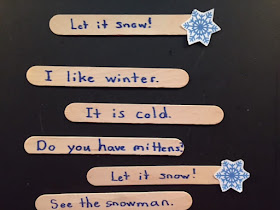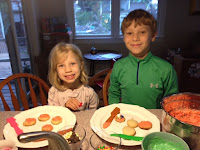Turn on Your Brain
Start your day by having the children turn on their brains.
Turn on the left side of your brain. (Make a twisting motion on left.)
Turn on the right side of your brain. (Make a twisting motion on right.)
Turn on your left eye. (Pretend to twist left eye.)
Turn on your right eye. (Pretend to twist right eye.)
Turn on your left ear. (Pretend to twist left ear.)
Turn on your right ear. (Pretend to twist right ear.)
You don’t have to turn on your mouth because it stays on all the time.
Now you are ready to learn!!!
Have the children hold up their thumbs. Go around, grab each child’s thumbs, and pretend to twist them as you say, “Rrrrrm! Rrrrrm! Now your brain revved up and ready to learn.”
Brain Sprinkles
Put a few spoonfuls of rice in a Pringle’s can and glue on the lid. Cover the can with sparkly paper. When it’s something important for the children to learn explain that you will put brain sprinkles on them. (Shake the can over their heads!)

Hocus Pocus!
Pretend to wave a magic wand as you say, “Hocus pocus!”
Put thumbs and pointers together to make circles and place around your eyes as you say, “Everybody focus!” Have the students leave on their focus goggles and look at the front of a book, a shape, a word, or whatever you want them to attend to.
Bzzzz!
Children stick out their index finger and tap a friend’s finger as they go, “Bzzzz!”
Thinking Caps
Goodness, this is old as the hills. Mrs. Meyers, my first teacher, used to say this to us. As ancient as it is, it’s still new to your little kiddos. Remind them that their thinking caps will help them remember and learn as you demonstrate putting an imaginary hat on your head.
Thinking Hands
Explain that when you cross your fingers and put your hands in your lap it helps your brain listen and learn.
Schema
Make circles with thumbs and index fingers and join them together to make a connection. Tell children as they listen to a book they can make this sign to let you know they are connecting what is in the book to what is in their brain.
Brain Sprinkles
Put a few spoonfuls of rice in a Pringle’s can and glue on the lid. Cover the can with sparkly paper. When it’s something important for the children to learn explain that you will put brain sprinkles on them. (Shake the can over their heads!)

Hocus Pocus!
Pretend to wave a magic wand as you say, “Hocus pocus!”
Put thumbs and pointers together to make circles and place around your eyes as you say, “Everybody focus!” Have the students leave on their focus goggles and look at the front of a book, a shape, a word, or whatever you want them to attend to.
Bzzzz!
Children stick out their index finger and tap a friend’s finger as they go, “Bzzzz!”
Thinking Caps
Goodness, this is old as the hills. Mrs. Meyers, my first teacher, used to say this to us. As ancient as it is, it’s still new to your little kiddos. Remind them that their thinking caps will help them remember and learn as you demonstrate putting an imaginary hat on your head.
Thinking Hands
Explain that when you cross your fingers and put your hands in your lap it helps your brain listen and learn.
Schema
Make circles with thumbs and index fingers and join them together to make a connection. Tell children as they listen to a book they can make this sign to let you know they are connecting what is in the book to what is in their brain.












































